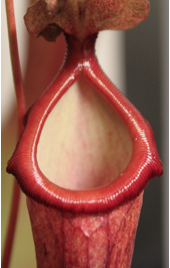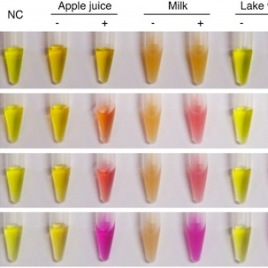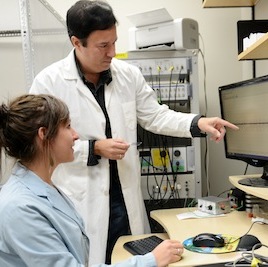Those suffering from dry eyes have to use eye drops as often as three times a day; a new nanoparticle-based technique could reduce that to once a week. Because our eyes naturally try to flush out any foreign substance, most of the drugs in an eye drop never actually reach the eye. The new nanoparticles […]
Tag: medicine
Saturated fat and heart disease, revisited
A new review suggests that national guidelines on the amount of saturated fats we consume per day need to be revisited. The authors note that while saturated fats can raise cholesterol levels, they have a relatively neutral impact on other key risk factors for cardiovascular disease, and that recent data from population studies challenge the […]

Pitcher plant inspires non-stick surface for medical implants
Researchers have developed a non-stick coating that could make implanted devices – such as blood catheters to artificial hearts – safer to use. Currently, some patients using these devices must be treated with drugs to prevent clots from forming, but these drugs pose risks to elderly or injured patients, making them prone to uncontrolled bleeding. The […]

Electronic monitoring reveals poor handwashing among hospital patients
A new system for monitoring handwashing has revealed that patients in hospitals only wash their hands about 30 per cent of the time while using the washroom. The study used electronic transponders attached to hospital bracelets and soap and hand sanitizer dispensers; by picking up ultrasonic signals from these devices, researchers could track who was […]
Common cause: how genes influence autism
A new study finds that mutations in two very different genes can have similar effects on developing brain cells, shedding light on the origins of autism. Researchers looked at neuronal stem cells with mutations in one of two genes; in humans, each of these mutations leads to a different neurodevelopmental disorder, although both disorders are […]
Need a stress-buster? Try exercise
Exercise has a proven track record for relieving stress, yet less than half of Canadians use it this way, according to a recent study. A survey of 40,000 Canadians 15 or older found that exercise ranked 8th out of 13 coping strategies, below “talking to others”, “looking on the bright side”, “ignoring stress” and even […]
Who is spending time in emergency departments?
Patients who need admission to hospitals but don’t require an operating room or critical care bed spend the most time in the emergency departments (ED) according to a new report. The study analysed 10 million emergency-room visits from the National Ambulatory Care Reporting System (NACRS). Some of the findings include: 90 per cent of ED […]
New rare genetic disorder traced to early Quebec settlers
A rare genetic disorder can be traced to early settlers in Quebec and their European ancestors according to a new study. Researchers have identified 16 people from Eastern Quebec of French descent who have Chronic Atrial and Intestinal Dysrhythmia. The disorder, also called CAID syndrome, is a combination of heart arrhythmia and intestinal obstruction. Researchers […]

Is ‘antimicrobial clothing’ for real?
Plenty of clothing products purport to kill bacteria that cause disease or damage fabric, but a new study suggests that what works in the lab doesn’t always work in practice. Researchers sealed fabric treated with one of three different antimicrobial agents against the skin of volunteers to see if they would reduce the amount of […]
Taking the pulse of stress
Researchers have discovered that, contrary to what you might think, a less variable heartbeat might be associated with a higher susceptibility to stress. The team recorded heart rate variability in 76 student participants while they were relaxing and while they were thinking about things they tend to worry about most. They also tracked participants’ moods […]
How railways helped AIDS spread in Africa
The HIV pandemic with us today may have begun its global spread from Kinshasa, the capital of the Democratic Republic of the Congo (DRC) around 1920, according to a new study. A team of researchers have reconstructed the genetic history of the HIV virus by analyzing gene sequences found in a major HIV database. The authors […]

A litmus test for bacteria
Researchers have developed a way to use litmus paper – which changes colour to indicate high or low pH – to provide a simple and effective test for bacteria like E. coli. The team used tiny strands of DNA to create probes that are activated in the presence of bacteria. The activated probes then catalyse […]

DNA signature in ice storm babies
A new study has detected a distinctive ‘signature’ in the DNA of children born in the aftermath of the 1998 Quebec ice storm. Five months after the 1998 Quebec ice storm, researchers recruited women who had been pregnant during the disaster and assessed their degrees of distress in a study called Project Ice Storm. Fifteen […]

The highs and lows of marijuana use
A new study helps explain why the same drug can have opposite effects at different doses. Using a drug that binds to cannabinoid receptors in the brain – the same ones that are activated by cannabis – researchers showed the precise pathway by which low doses stimulate the brain’s dopamine system, which can lead to […]

Old drug may be key to new antibiotics
Researchers screening old drugs for new uses have found one that offers a previously untapped strategy for preventing the growth of harmful bacteria. Many antibiotics work by interfering with the bacterial ribosome, a kind of biochemical workshop where proteins and enzymes needed for the growth of the bacterium are produced. In this case, the team […]
South Asians in Canada have higher risk of heart disease
Canadians of South Asian background are more at risk of heart disease and diabetes than white Canadians, a new review of literature reports. However, they are less likely to smoke and are less obese. More than one million Canadians whose ethnicity hails from India, Pakistan, Sri Lanka, Nepal and Bangladesh live in Canada, comprising about […]